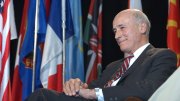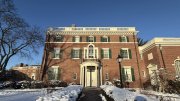Alain de Vergie ’56 finds it entertaining and informative to scan the want ads when he reads the paper. One Sunday morning in 1992, he came across a small advertisement in the Washington Post that intrigued him: the U.S. Department of State was looking for a specialist in landscape architecture. “I called to see what it was all about,” says de Vergie, who earned a bachelor’s degree in that field at the University of Michigan and had worked in private firms ever since. He got the job, and now, as the department’s sole landscape architect, he oversees site planning and design for American embassies all over the world. He designs some projects himself, coordinates others, and acts as administrator for overall site-planning, so that his tasks at the Office of Foreign Building Operations run the gamut “from pencil-on-paper to the philosophical.”
In conversation, de Vergie quickly dispels the notion that he thinks mostly about plants. He must consider a multitude of factors for each location, ranging from site drainage to lighting for parking lots to pedestrian routing for the many different types of visitors who arrive at embassy buildings each business day. “Design at all our sites is guided by several basic principles,” he observes. “Security is a paramount concern, naturally. First and foremost, we have to protect the safety of our employees and visitors. Beyond that, an embassy complex is expected to be attractive, yet it must not appear ostentatious or extravagant. It presents an image of America in a foreign capital, and a widely held sentiment at State is that it should reflect the openness and optimism of the American people. Practically, of course, how to portray openness and optimism within current anti-terrorism requirements—nine-foot tall solid concrete walls and steel-barred gates—is a designer's nightmare.” Nonetheless, de Vergie finds that creative thinking can overcome many of these challenges. And success is possible despite the chronically low budgets passed by Congress.
Then there are the plants. “We insist on plants we can obtain locally,” he notes, “and we try to incorporate local horticultural traditions as far as possible—but it isn’t always easy.” For the American embassy in Kuwait, for example, the State Department’s architectural advisory board at first suggested an “oasis setting.” When that plan encountered severe criticism from other American officials for its potentially extravagant use of fresh water, an “oasis” created with native plants tolerant of brackish water was specified. “The only plants I observed that met these requirements,” de Vergie reports, “were some scraggly grasses being used as camel fodder.” Eventually he devised a way to mix the readily available brackish water with the minimum amount of fresh water needed to sustain plant life, and the embassy got its date palms and lush lawns.
One consolation when problems pile up is that he will soon be in a totally different climate—such as Thailand, where the grounds of the new Bangkok embassy office building suffer torrential rains and flooding. In 1999 de Vergie visited 15 cities on five continents in 11 months—“a record I hope never to match,” he says, “but with seven new embassy projects starting this year, I keep my bags packed. When the ice begins to break up in the spring, I know I’ll be on an airplane.”





